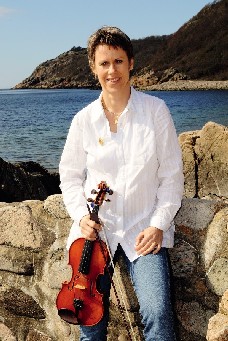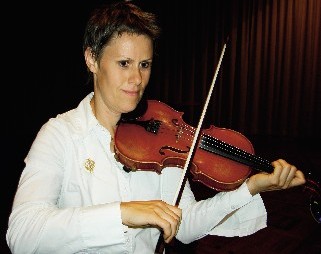
Karin Wallin @ Folkworld: FW#37
FolkWorld Issue 37 11/2008; Article by Eelco Schilder
Guldpolska
Karin Wallin's Golden Music
She is only the seventh woman awarded with the golden Zorn medal and one of the youngest ever. Since fifteen years she is a ‘Riksspelman’ and only this year her debut album was published. A good thing, because ‘Guldpolska’ - as her CD is called - took me by surprise and became one of my favourite Swedish fiddle albums ever. This made me curious who this musician is. Although she assured me her English wasn’t that good, she was more than happy to tell about her music, the important role of her father and being awarded with the highest medal a Swedish violinist can get. This is the story of Karin Wallin.
Wallin grew up in a family where traditional music and dancing was part of daily live. Her grandfather founded the Helsingborg Folkdance association, also her parents showed a more than average interest in the music and dancing.
 Karin Wallin @ Folkworld: FW#37 |
“At home when I was young nobody played folk music on instruments. We listened a lot to a tape recorder my father used when he went out to interview people and we listened to old LP’s. My mother was a singer, but not a folksinger. She and her twin sister travelled around in the South of Sweden and performed in parks and churches. My sister and brother played the piano and I was playing the recorder piano with only one finger. I never listened to modern music and my sister often wondered about that. I did try it, I just didn’t like it. The only thing that I really loved listening to was the folk music, and until today I love that style of music.”
Starting with the recorder and ‘one finger piano’, there came a moment that Karin Wallin fell in love with the violin and it is that instrument that brought her the award and recognition. “Somehow I never decide to play the violin in a serious way. All the time I play because I just can’t resist taking my instrument and make music. When I was young I would have loved to go to a music school, but I didn’t have enough self confidence to really attend the school. I can’t read notes and I thought that if you can’t read notes, you will never make it in such a place. My father helped me a lot, he gave me the frame of a music piece and inside that frame he encouraged me to play how I like it. Although he made sure that I would stick to the frame, there was so much room to put my own ideas in a tune that I just simply loved it. I’m sure that because I learned the music in this particular way, I’m able to play the way I do nowadays. You know, I just love playing the two strings at the same time and create a drone and a melody at the same moment. You should hear my new violin, it’s made by Anders Norudde, one of the Hedningarna members and I just loved it from the first moment I hold it in my hands.”
So it was just impossible not to play the violin. Wallin fell in love with the sound and just couldn’t stop playing. She was inspired by the two famous Swedish violinists Bengt Löfberg from Småland and Kalle Almlöf from Malung, Dalarna. She used to play along with their records and reached her high level of playing by pure self educating. Was there no teacher at all? “Once I asked a friend to help me improve my play, I wanted to educate myself in some way. But it was only one lesson, according to him I did so much wrong and I had to change so much that after one lesson I decided not to ‘improve my techniques’ but only have fun. I think that I actually learned a lot from my education for my daily job. I’m a Rosen and Cranio sacral therapist and during my education I noticed that when I learned to relax, to change my body, the music also sounded better. But otherwise it really was the hours and hours of playing at home and playing at my fathers dance events that made me the musician I am today.”
The violin plays an important role in the Swedish traditional music. In Holland, where I come from, we don’t know such traditions. What is the status of the violin in Skåne?
 “The role of the violin as an instrument in the traditional folk music in Skåne is very strong. In fact it’s still the most common instrument to be played. Some years ago it was quite uncommon that women played the violin but nowadays there are as many women as men playing violin. In Skåne we also have a special type of violin (träskofiol = clogfiddle) that is made of an old wooden shoe. It was an instrument for the poor people and new beginners.
The role of the folk music in daily life could be more important but it’s still common to have fiddlers by your wedding and at midsummer celebrations, but most is played at spelmansstämmor (festivals).”
“The role of the violin as an instrument in the traditional folk music in Skåne is very strong. In fact it’s still the most common instrument to be played. Some years ago it was quite uncommon that women played the violin but nowadays there are as many women as men playing violin. In Skåne we also have a special type of violin (träskofiol = clogfiddle) that is made of an old wooden shoe. It was an instrument for the poor people and new beginners.
The role of the folk music in daily life could be more important but it’s still common to have fiddlers by your wedding and at midsummer celebrations, but most is played at spelmansstämmor (festivals).”
Wallin already mentioned that it was very uncommon for women to play the violin, but now this year she was the seventh woman ever and one of the youngest ever to be awarded with the Zorn medal. What did change for her by winning the Zorn medal and what exactly is this medal? “The Zorn gold medal is a medal that is given once a year to a skilled folk musician. It’s a great honour to get it. It tells you that your way of playing is in the right tradition. It was really big for me to get it. I had never thought that I would ever get this award. It does change things, the same when I became riksspelman. It’s a good title because when you want to play somewhere and people don’t know your name but see you are a riksspelman or have the golden Zorn medal, they want you, they know they get the right quality.”
It took many, many years before a debut album was published. But now, after winning the medal it’s finally there. “I started to do a CD when my father was alive, but it wasn’t finished when he died in 1992. So I didn’t finish the CD and just a year passed by with other things on my mind. Actually I was just thinking that I’m about to become a retired player and had peace with that. Until the moment they called me with the news about the Zorn medal. Suddenly I got a lot of offers for concerts and I contacted the Nordic Tradition label and asked them if they were interesting in recording a CD with me. They said yes and I started the recordings. I think the CD can be seen as an oversight of all the music I play. The most important for me was to play tunes that I really love, but also give a picture of my father's research work. I’m very happy with the result, I played it in the studio and I only think that when I would have had some dancers around, it might even been a bit better. I haven’t read that much critics on the CD yet, but the ones that I got are very positive. It keeps me motivated to continue and I dream about meeting more people who enjoy music the same way I do and just play more and more with the same fun I have in all those years that are behind me.”
Guldpolska is published by the Nordic tradition label, catalogue number NTCD12 (www.nordictradition.com).
Photo Credits:
(1) Karin Wallin (by Thomas Palm);
(2) Karin Wallin (by Bengt Wihlborg).
|
To the German FolkWorld |
© The Mollis - Editors of FolkWorld; Published 11/2008
All material published in FolkWorld is © The Author via FolkWorld. Storage for private use is allowed and welcome. Reviews and extracts of up to 200 words may be freely quoted and reproduced, if source and author are acknowledged. For any other reproduction please ask the Editors for permission. Although any external links from FolkWorld are chosen with greatest care, FolkWorld and its editors do not take any responsibility for the content of the linked external websites.
